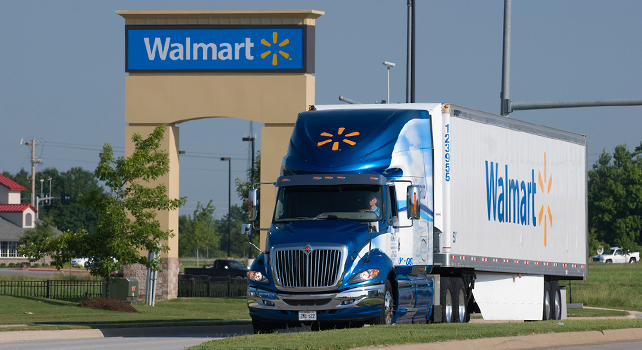Think Again. Northern Arkansas isn't just the home of the world's largest retailer. It's the home of an array of cutting-edge retail and tech companies that got their start in part because Walmart is here.
Image courtesy of WalMart
UNITED STATES
OF INNOVATION
New Ideas, New Markets, New Insights
All around the country, Americans are dreaming big. Their boldest ideas are changing their communities--and having a ripple effect throughout the world.
A few years ago, Abby Kiefer and her husband Kurt Kober started nursing the idea for a company that would crowdsource the design of home décor items, like vases and pillowcases. It was a night-and-weekend kind of daydream. Both had full-time jobs, Kiefer as a city planner in San Francisco and Kober as an account manager for the Oakland-based Clorox Company. Their idea grew until that inevitable moment when it got too big for part-time tinkering. “At that point, one of us was going to quit our jobs in the Bay Area,” Kiefer says. “And it was like, uh shoot, we’re not 24 and wanting to live on ramen any more and out of a studio apartment.”
Clorox happened to offer Kober a sales rotation at that very moment, and the couple (he’s 34, she’s 31) could have moved anywhere to launch the new business. They could have gone to Portland, or Seattle, or Tampa (Clorox products are sold, well, everywhere).
“And then there’s always Arkansas,” Kiefer recalls discussing over dinner one night. That might sound a little strange if you know nothing about retail. But Northwest Arkansas is America’s undisputed epicenter of selling stuff. Walmart, the world’s largest retailer, is based there, as is Tyson Foods and J.B. Hunt, the trucking giant that moves everyone’s merchandise. Over the last decade, as Walmart has encouraged its suppliers to huddle close to its Bentonville hive, hundreds of other companies have set up offices in Arkansas, too.
Northern Arkansas is the modern-day Mecca for retail.“Where better to go than this kind of retail bubble of the universe?” says Kiefer, who now runs her startup, Red Clay, out of Bentonville (as for Kober, he’s now Clorox’s national account manager for Walmart). “Everybody who sells something knows of this place, and a lot of them have an office here, and lot of them have connections here. It was like holy crap, it would be perfect.”
Outside of Arkansas, this corner of the state is best known for its most famous adopted son, Walmart’s Sam Walton. But the burgeoning startup scene Red Clay has joined is turning this place into something else: not just the home of Walmart, but the home of an array of innovative retail/tech companies that got their start in part because Walmart is here.
“We sort of see it as the modern-day Mecca for retail,” says Jeannette Balleza, the director of a new startup accelerator in Northwest Arkansas, the ARK Challenge. It will select its first class of entrepreneurs this summer focusing on the three areas in which Walmart, Tyson’s, and J.B. Hunt give the region outsized expertise: retail, food services, and logistics. The University of Arkansas in Fayetteville has also cultivated a specialty in this space, with both a Center for Retailing Excellence and an RFID Research Center. “What I hear from venture capitalists,” Balleza says, “is that ‘unless you can tell us you’re best in world at this, or you have some unfair competitive advantage, we’re not going to look at you.’ And for these three areas, we feel like yes we’re the best in the world.”
It’s easy to envision what innovation looks like in more tech-heavy industries. It’s a hybrid car, or a flying drone, or a new iPhone. But in retail?
“The issues that we’re solving are decades old,” says Henry Ho, a former and long-time Procter & Gamble employee in Arkansas who is now behind some of the area’s other retail startups (he, too, moved here because of Walmart). Modern technology, however--and crowdsourcing in particular--have unleashed new tactics for answering those old retail questions: How do you keep accurate tabs on consumer demand? How do you make sure your inventory matches it? How do you more efficiently develop, distribute and display products? And how do you know if people just don’t like them (or would like them better if they came in blue)?
One of Ho’s projects, a company called Field Agent, turns smart-phone-wielding shoppers into retail intelligence-gatherers. As they move through stores, these “Agents” (shoppers who get paid for their efforts) can photograph displays, scan bar codes and offer opinions on everything from how clean a store is to whether its products are displayed right. In aggregate, this information can tell a company like Walmart how its stores are performing, without having to sending an auditor to all 3,700 of them.
This is a big business for retailers and suppliers who are invested in every detail of your shopping experience, right down to the “planogram compliance” (yes, there is an industry term to describe how products are displayed on a shelf, with certain items at eye level and others lined up just so).
Whether you agree with them or not, Walmart, Tyson’s, and J.B. Hunt managed to change their industry.Kiefer’s crowdsourcing concept with Red Clay similarly touched a nerve with home-décor retailers. Red Clay produced a textile and ceramic line by crowdsourcing the proposals of numerous designers for the most popular ideas. When Kiefer took the end products to trade shows in New York and Atlanta earlier this year, several large retailers loved Red Clay’s designs. But they loved the concept even more. Nobody was crowdsourcing product designs before producing them (and Red Clay proved that doing so could turn out items that actually look good).
Kiefer realized that the process was her best product. And now, starting in August, instead of producing its own products, Red Clay will manage the crowdsourced design of a line of table-top items for a national department store. Designers will get a chance to display their portfolios before major brands, and large retailers will for the first time be able to invite their customers to pick their favorite designs before they go into production.
In nearby Fayetteville, another company called TTAGG is also mining the knowledge of crowds for information coveted by retailers. TTAGG trolls social data for marketing research and insight--for clues into what people are saying about Target on Twitter, or what they’re writing on product review sites. The company has created a kind of real-time focus group, one that costs a lot less and covers much more ground than the old-school, sit-down variety. A typical 10-person, one-week focus group can run a company anywhere from $50,000 to $150,000. And it only gives feedback from those few people (in response to the questions retailers thought they needed to ask).
“[Our] data isn’t limited by what you hypothesize the problems or the answers might be,” says Ryan Frazier, one of TTAGG’s founders. “There’s a whole discovery piece to it.” And as services like this bring down the cost of market research (and improve the efficiency of retailers), they may bring down the price of products you buy as well.
The stories of all of these startups seem to interlock. They’ve connected through the same angel investors--the Fund for Arkansas’ Future, or Gravity Ventures--they’ve come to know the same people around town or to trace their roots back to the same companies. Joey Nelson and Matt Hudson met at Rockfish Interactive, while working on mobile development projects for Walmart and Sam’s Club. Six months ago, they created their own mobile gaming company, MobileFWD, which launched its first app this month. Their partner in the endeavor is John James, the CEO of an e-commerce empire in the area. In talking about their own ideas, Nelson and Hudson rave about Field Agent’s, and Henry Ho does the same.
“I really feel like it’s all seeded by a community that was inspired by Sam Walton,” Hudson says.
All of these entrepreneurs also share nearly identical stories about what it’s like to tell someone from outside of Arkansas that you’ve launched a business there. Investors expect them to relocate to Silicon Valley. Potential clients do a double-take by phone: “You’re calling from where?” And then there are the coastal types startled to hear they even have access to an airport in Arkansas.
But none of this sounds like it bothers any of them.
“There are some pretty big companies that have come out of here that have completely changed the face of the industry they’re in,” Kiefer says. “Whether you agree with them or not, Walmart, Tyson’s, J.B. Hunt, these are big companies that all started out totally tiny. Over the course of a couple of decades, they managed to change their industry.”
[Top Image: Walmart] via Emily Badger and fastcompany.com


No comments:
Post a Comment